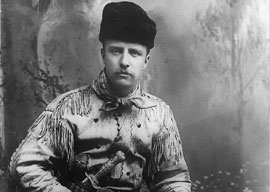
April 06, 2014

Young Theodore Roosevelt
Those who believe in equality of opportunity must want, if they take the idea seriously, to make the world not only just but fair. Genetic and family influences on the fate of people have to be eliminated, because they undoubtedly affect opportunities and make them unequal. Ugly people cannot be models; the deformed cannot be professional footballers; the retarded cannot be astrophysicists; the small of stature cannot be heavyweight boxers; I don”t think I have to prolong this list, as everyone can think of a thousand examples for himself.
Of course, it might be possible to level the field a little by legislating for equality of outcome: by, for example, insisting that ugly people are employed as models in proportion to their prevalence in the population. English novelist L.P. Hartley, author of The Go-Between, satirized such envious suppression of beauty (and, by implication, all egalitarianism other than that of equality under the law) in a novel called Facial Justice. It’s not a very good novel, as it happens, but the idea is very good; Hartley envisages a state in which everyone aspires to an “average” face, brought about by plastic surgery both for the abnormally ugly and the abnormally good-looking. Only in this way can the supposed injustice (actually it’s unfairness) of the genetic lottery be righted.
Hartley’s novel is a reductio ad absurdum of a pernicious idea. By contrast, Roosevelt’s “measurable quality of opportunity” is roughly achievable by human design: only roughly, of course, because some (though few) will still be excluded biologically, and there are (again few) upbringings so terrible that they preclude opportunity for the person to become anything much. But the aspiration to deny no one a “measurable quality of opportunity” is not intrinsically nasty, as is the insistence on equality of opportunity. On the contrary; our problem is, however, that the political arrangements needed to bring this about already exist in most Western countries, and still we are unhappy or discontented. Thus we”many of us, that is”attribute our unhappiness to inequality of opportunity for fear of looking elsewhere, including inward.
Politicians love equality of opportunity as an ideal precisely because it is impossible”barring arrangements that would make North Korea seem like a libertarian paradise”to bring about. And because it is impossible, it is a permanent promise of employment for them, as they try to square the circle or construct a perpetual motion machine. It guarantees their importance, and the attainment of importance is probably the most powerful motive of all politicians.
There is only one country in the developed world, as far as I know, in which politicians are accorded no importance whatever: Switzerland. All the same, I am not sure I would like to live there. Perfection is not of this world, and if it existed it would be horrible.